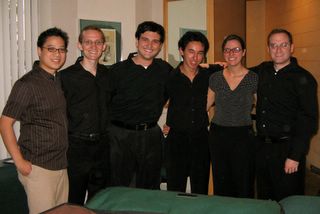Anyway, the reason I bring this up is that the past couple weeks - really, the whole Kent/Blossom festival up to this point - has been the exception to the rule. I've played all sorts of strange unfamiliar stuff that I'd never done or even heard of before this summer. This includes the Schoenberg Chamber Symphony no. 1, op. 9, which I performed last night, as well as the Hummel Piano Quintet this evening.
The Schoenberg is a piece I had heard before, but I was never lucky or brave enough to attempt to play it. Luckily, we had an able conductor here, Cleveland Orchestra Assistant Conductor Andrew Grams, and a lot of talented and motivated musicians. The Opus 9 seems to stretch every musical parameter to its breaking point, from tempo to tonality to the very definition of chamber music - there are 15 parts, sometimes scored as densely as any Brahms symphony; yet just one musician is on each part, and the piece requires the flexibility and transparency of great chamber music playing.
Our coach for the piece was the Cleveland Orchestra E-flat clarinetist Dan McKelway. he had a great story - speaking of stretching to the breaking point - about performing the piece on a tour of Musicians from Marlboro. In every one of their six performances the second violinist broke a string on the same note, a fortissimo pizzicato midway through the piece - which really pissed the horn players off, because it meant starting the piece again from the beginning. At the final performance, in Carnegie Hall, the stagehands were not around to open the stage door to let the violinist get a new string. So he sort of wandered around the perimeter of the stage, pushing on the wall panels to find one that would open.
Our second violinist didn't break any strings in the performance, though if he had, I would have been happy to start over again, because I had a great time playing the piece. I only wish our performance had been a little more settled, less jittery. Our horn player Mike said something I agree with, that a piece like that is easy to make sound hard - the real challenge is to make it sound easy and fluid. Sort of like when a great sculptor makes you forget that marble doesn't come out of the ground textured like flowing silk, it has to be meticulously chiselled to look like that.
Tonight we played the Piano Quintet by Johann Nepomuk Hummel, which was a lot more exciting than you might think. Our violist Davis blogged amusingly about it last week. I admit I was a little skeptical of the piece at first - after we first read it I said, "This piece is sort of a joke, right?" and I found ways to sneak the word "trout" into most of my subsequent comments. The piece has the same instrumentation as Schubert's famous Trout Quintet, and in fact Schubert wrote his quintet for a group that he heard rehearsing Hummel's piece. I'm sure Schubert meant it as a tribute to the older composer, but it probably had the effect of driving Hummel's piece into obscurity.
Like his piece, Hummel seems to have spent much of his life associated and often eclipsed by greatness. He studied piano with Mozart and composition with Haydn, and eventually took over Haydn's job at Esterhazy. For a while he was a minor celebrity in Weimar, as the New Grove Dictionary of Music reports:
Hummel settled into a thoroughly bourgeois existence, complete with house and garden. Through Goethe he met the leading figures of the intellectual world and soon became one of Weimar's tourist attractions: without seeing Goethe and hearing Hummel play, no visit to the town was complete.He had something of a rivalry with Beethoven for a while - they were the most respected pianists and composers of the time, and their disciples had a little bit of Viennese gang warfare going. They patched up their differences, though - Hummel seems to have been a very pleasant guy, which shows up in his music in a tendency to give everyone a nice melodic solo towards the end of the piece, except the bass player. Hummel was a pallbearer at Beethoven's funeral, and at a memorial concert he performed an improvisation on the prisoner's chorus from Fidelio. It must have been a touching moment, sort of like the end of West Side Story, when the Jets and the Sharks decide to get along, or when they spill the bottle of malt liquor over the grave in that Boyz II Men video.
I'm maybe getting a little sleep-deprived and stupid, so I'll spare you my commentary on Hummel's later years. Performing his Quintet was really a delight, and we all developed a great fondness for the piece. We decided that all it lacked to reach the Trout's popularity was a good fishy nickname, so I proposed calling it the Gefilte Quintet - like gefilte, it has a sort of a pungent mixture of textures and styles. We were coached by pianist Jerry Wong, an insightful chamber musician and fashionable dresser in all seasons.

Jerry Wong and the fishy five



 Technorati Link Count: no. of blog reactions to this post
Technorati Link Count: no. of blog reactions to this post
3 comments:
Matt,
As always, a good read!
fashionable dresser in all seasons hahhhhh
I love Schoenberg's Op.9! I gotta find some opportunity to play that one of these days. I love the Orpheus recording of that one...
I had ordered those Hummel parts a few months ago but the distributor threw up their hands and gave up after letting the order remain open for like three months or so.
Post a Comment